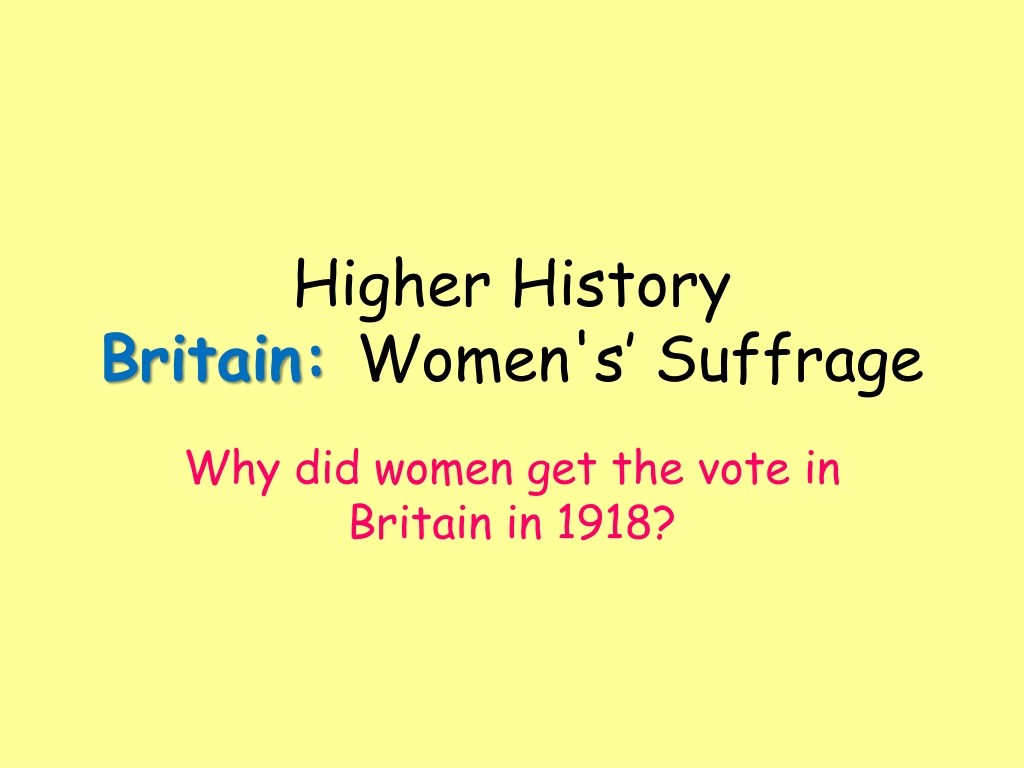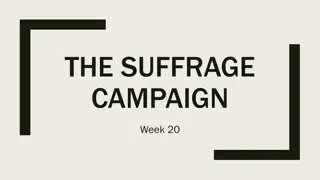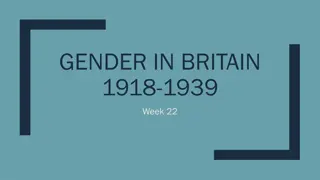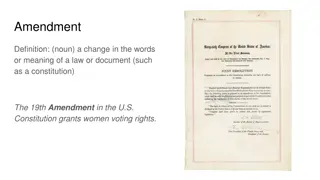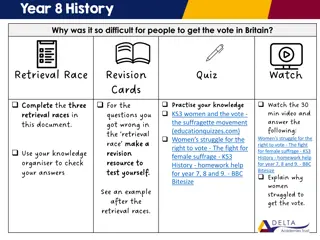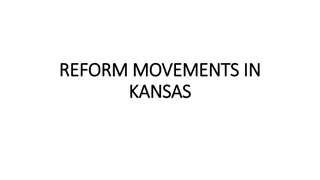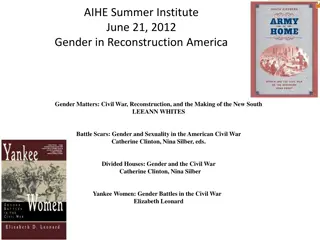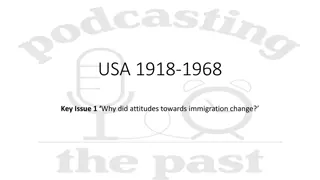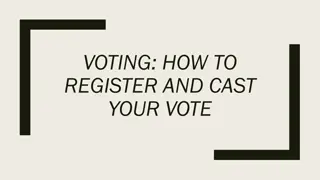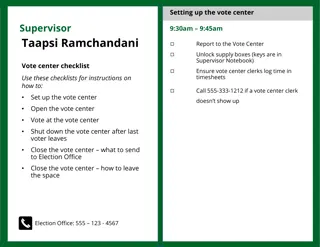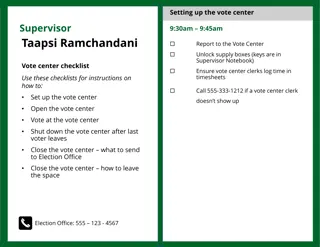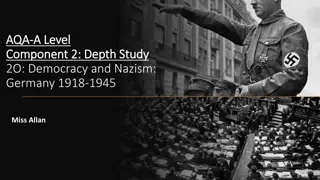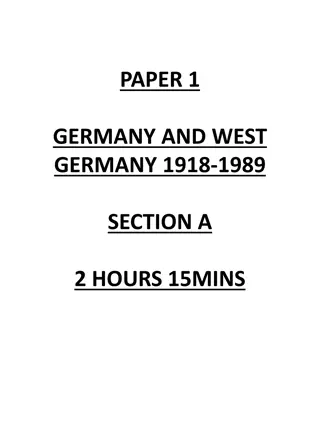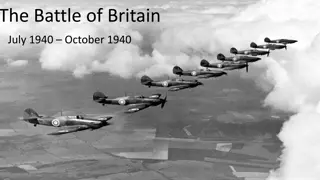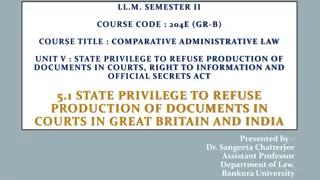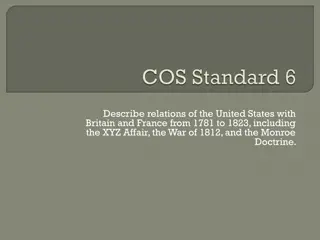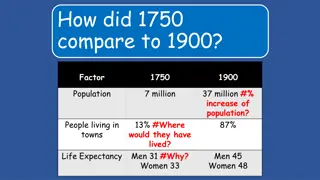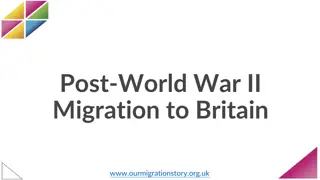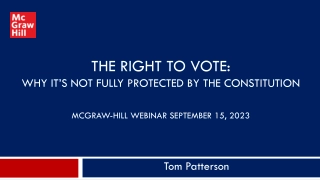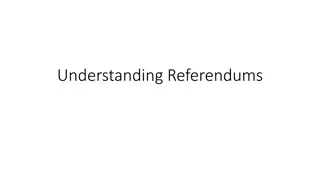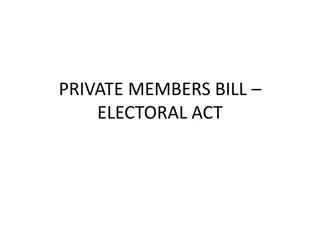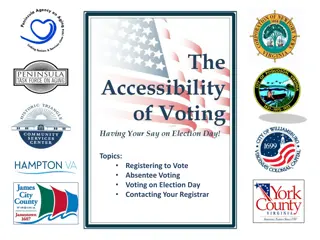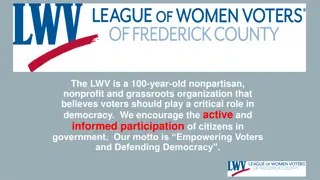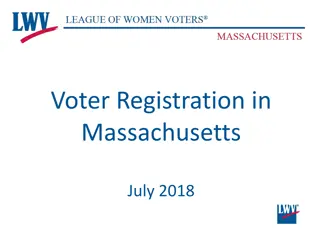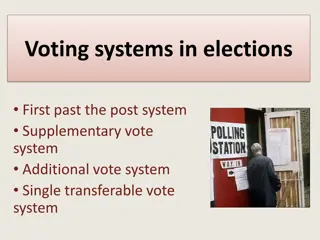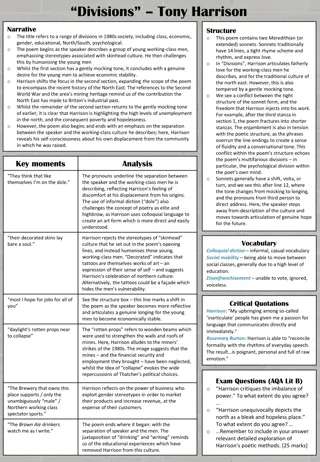Women's Suffrage in Britain: Factors Influencing the Vote in 1918
Understanding the complex factors surrounding women's suffrage in Britain in 1918 provides insight into the role of pre-war changes, suffragist movements, suffragettes, war work, and foreign influence in shaping the path towards women gaining the right to vote. This analysis explores the nuanced progress and challenges faced by women striving for political equality.
Download Presentation

Please find below an Image/Link to download the presentation.
The content on the website is provided AS IS for your information and personal use only. It may not be sold, licensed, or shared on other websites without obtaining consent from the author. Download presentation by click this link. If you encounter any issues during the download, it is possible that the publisher has removed the file from their server.
E N D
Presentation Transcript
Higher History Britain: Women's Suffrage Why did women get the vote in Britain in 1918?
Task Write the introduction to the following question To what extent was women s war work the main reason women got the vote in 1918?
The arguments for women getting the vote The Factors 1. Pre war changes (pre 1914) 2. The Suffragists 3. The Suffragettes 4. War Work 5. Foreign Influence You should aim to cover 4 of these in your essay; but you must know all of them in case it is the isolated factor.
Background (need this for intro) During the 19thcentury many laws were passed which made Britain more democratic by enfranchising men, but women were never given the right to vote in elections Most men and politicians ( all male), believed women were uneducated, unworldly, fickle, immature and understood little about the world of politics, economics and business A woman s place was believed to be at home in the role of wife and mother; men and women were seen as operating in separate spheres or worlds; men in politics and outside world and women at home with the family Women viewed the vote as the first step in giving them a voice nationally to force greater change for women in Britain in all sorts of areas e.g. education, jobs etc.
Pre war changes: Knowledge Towards the end of the 19thcentury things had been improving for women slightly in terms of the law & their opportunities. In 1882 & 1893 Women s Property Acts gave women full legal control of all property they owned at marriage or that they had inherited or earned whilst married In 1872 universal primary education became compulsory for boys and girls and became free in 1890 so there was no longer a good reason not to educate girls. University became more accessible for women with many universities allowing women through their doors for the first time to study degrees and even female colleges, i.e. Girton College Cambridge From 1869, women could vote in local elections if they paid taxes and could even stand as a candidate for local elections in 1894 white collar jobs involving typing and clerical work in insurance offices and banks opened up and created better paid and higher status career opportunities alongside other traditional female professions like nursing and teaching
Pre war changes: Analysis Analysis (basic) This shows that the status of women in society was improving as they gained more legal rights, became better educated and participated fully in local politics - the prejudiced attitudes of some men and politicians began to change. It showed women deserved the vote and proved that there was nothing to fear by giving women the vote they were reversing the view that women were too stupid, irresponsible and immature for politics.
Pre war changes: Analysis Analysis (+) However, even though women were making some progress they were still expected to leave their jobs when they were married (the marriage bar), many universities still would not admit women and the number of women serving on local councils was very small 24 out of 11,140 local councillors In addition, many middle class women in the late 19th century cared little for women s rights and were horrified that women wanted to advance their position in society even Queen Victoria called women s rights a mad, wicked folly in 1870
The Suffragists: Knowledge The National Union of Women's Suffrage Societies (NUWSS) was founded in 1897 under the leadership of Millicent Fawcett and campaigned for women s suffrage They believed in moderate, peaceful tactics or peaceful persuasion to win the vote for middle class women and were nicknamed The Suffragists They campaigned using meetings, pamphlets, petitions and parliamentary private members bills to give women the vote which were introduced by sympathetic backbench MPs Their membership was around 53,000 by 1914 and they reached agreements of mutual support with some male Trade Unions and the new Labour Party.
Suffragists: Analysis Analysis (basic) The suffragists impressed many people, male and female, including politicians, and showed that they were intelligent, well organised and mature capable of organising a successful nationwide campaign. The NUWSS were successful in winning the support and respect of many important MPs and future PM David Lloyd George and have been credited with turning the tide in parliament towards women's suffrage with nearly half of all MPs supporting women s suffrage by 1914.
Suffragists: Analysis Analysis (+) However, many historians have claimed that the suffragist campaign was tedious and slow moving and was too easily ignored by anti-suffrage politicians like Prime Minister Asquith and the suffragists were never able to achieve the publicity and impact of the Suffragettes In addition, some historians claim that despite the large NUWSS membership many women supported more militant groups like the Suffragettes as they felt the NUWSS was being ignored.
The Suffragettes: Knowledge Emmeline Pankhurst was a NUWSS member who became tired of their slow progress and formed the Women s Social and Political Union (WSPU) with her daughters Christabel and Sylvia in 1903 They had the motto deeds not words and wanted to use more militant tactics to breathe new life into the suffrage campaign disrupting meetings, heckling MPs, chalking slogans on streets In 1905 they made headlines when Sir Edward Grey a government minister was heckled noisily and the two WSPU members responsible were arrested following a struggle and imprisoned the Daily Mail nicknamed them The Suffragettes Mrs Pankhurst being arrested.
The Suffragettes: Knowledge When HH Asquith became Prime Minister in 1908, he was at best a lukewarm supporter of women s suffrage so the WSPU stepped up their campaign, the Suffragettes entered their wild period in protest They smashed windows, poured acid into letterboxes, carried out arson attacks e.g. Ayr & Lanark Racecourses, sent letter bombs. Security was tight across the country i.e. at Holyrood Palace In 1909, Suffragette Marion Dunlop started a hunger strike campaign in prison designed to embarrass the government. Hunger strikers were violently force fed by doctors, it gained massive publicity for the cause of women suffrage. In June 1913, Suffragette Emily Davison died after running out in front of the King s horse Anmer at the Epsom Derby whilst waving a flag of Green, White & Violet (GWV=Give Women Votes)
Suffragettes: Analysis Analysis (basic) It cannot be denied that the Suffragettes succeeded in their aim of publicity; they regularly made national headlines, were discussed often in parliament as unlike the Suffragists their violent methods were impossible for the government to ignore. The Suffragettes certainly caused trouble for the government and did force them to act to try and save face the Cat and Mouse Act was passed in 1913 to let hunger striking women out of jail temporarily until their health recovered. The lengths the Suffragettes went to gained support and admiration from some people across the country who believed the government should give women the vote in order to end the disruptive militant campaign.
Suffragettes: Analysis Analysis (+) However, many historians have claimed that the Suffragettes actually held back votes for women because their violent actions reinforced the idea that women were irresponsible, immature and not fit to vote. Historians argue that the Suffragettes also undid some of the progress that the Suffragists made between 1897 and 1903 and actually caused votes for women to regress due to their bad behaviour Many MPs were incensed at the law-breaking campaign of the WSPU and changed their mind about giving women the vote a Conciliation Bill (new law) in 1912 to give the vote to some women was easily defeated as a direct result of Suffragette violence.
War Work: Knowledge Two days after war was declared on Germany in August 1914, both suffrage groups announced a suspension of their political campaigns for the duration of the war The WSPU were given 2000 by the government to stage a march and a propaganda campaign demanding Women's Right to Serve and help the war effort The Suffragettes even changed the name of their newspaper from The Suffragette to Britannica and they focussed on patriotism rather than the suffrage for the duration of the war
War Work: Knowledge The Suffragettes also began the White Feather campaign to increase recruitment for the army by shaming men not in uniform with the white feather a symbol of cowardice. This patriotic attitude of the suffragettes impressed the public, politicians and the press who were now praised for their patriotic efforts.
War Work: Analysis Analysis (basic) Both Suffrage campaigns gained support and respect due their willingness to stop their campaign for the vote and show they were as patriotic as men and get behind the war effort . Analysis (+) However, the Suffragettes and suffragists were making little progress towards the vote before the war and could not really claim a lot of the credit for women wanting to do their bit for the war effort after 1914 which was well underway as millions of women worked to supply the war effort.
War Work: Knowledge Women's war work was important to Britain s ability to fight and win and women stepped into the gaps when around 3million men went to fight Women worked in a variety of jobs e.g. as conductors on trams, as typists and secretaries and 20,000 women worked in government departments Over 810,000 women worked in munitions, 30,000 in Scotland alone. Explosions were commonplace and TNT poisoning caused women to be nicknamed canaries (around 400 women died form TNT poisoning during WWI) By 1917, 25,000 were working on farms with around 23,000 In the Womens Land Army growing food for those at home and soldiers at war
War Work: Analysis Analysis (basic) The work that women did was of major national importance and everyone in Britain was thankful to the nation s women for the role they had played and it was widely accepted that Britain couldn t have won the war without women workers supplying the troops, this shows a major change in attitude towards the importance of women. The government s change of attitude towards women is clear when they put up billboards all over the country with The Nation thanks the women . Newspapers called women workers heroines showing evidence not just of a new respect but perhaps a willingness to consider female suffrage as a reward for all their hard work. The reward theory that women were given the vote as a reward for their hard work in the war seems strong as the government were under pressure from the public and press to reward women in some way.
War Work: Analysis Analysis (+) In 1918 mostly married women 30+ were given the vote which would seem to back up the reward theory however some historians have stated it does seem a strange reward because the majority of women who did war work were in their early 20s and were still not entitled to vote. The reward theory is too simple that the war alone caused a major change in attitude towards women and ignores the campaigns of both suffrage groups who also helped change attitudes. The reward theory also ignores the pre-war changes women experienced in education and employment that also helped change attitudes. The war was merely a catalyst which served to change the views of politicians who still opposed women s suffrage e.g. it would be easier for MPs to give the vote to heroines in 1918 than terrorist Suffragettes in 1914 so the war merely made it more publicly acceptable to give women the vote.
Foreign Influence During the 19th century, Britain saw itself as the cradle of democracy and one of the most politically advanced societies in the world; Britain s empire included around of the world with colonies such as Australia, New Zealand, Canada However, more democratic nations around the world had granted women s suffrage much earlier e.g. New Zealand in 1893, Finland 1872 and Norway in 1907, which had been very successful. British politicians were under pressure to match this, it was embarrassing that the British colonies gave women the vote yet Britain denied this to its own women.
Foreign Influence: Analysis Analysis (basic) As the most developed nation in the world and a Great Power it was embarrassing for Britain that other countries appeared to be overtaking Britain in terms of democracy, particularly when the government argued that WWI was fought to protect democracy in Europe Britain could not lag behind The fact that women had been enfranchised abroad, particularly in colonies like New Zealand, may have added pressure to politicians and certainly given hope and renewed enthusiasm to the suffrage campaigns
Foreign Influence: Analysis Analysis (+) However, there exists no evidence to say that foreign influence played any part in the government s decision to extend the franchise in 1918 and no evidence to say it was even discussed by MPs in parliament It was likely that between 1914-18 British politicians were far more concerned with the war effort on the Western Front and at home than they were with events in Russia and many historians have downplayed Red Clydeside and the importance of the Rent Strikes
Consolidation A good idea when you have taken all your notes for a topic is to create a condensed revision guide for the essay This might be a mind map, picture map, bullet points etc. but should fit on one page Do this for homework (example on next page)
Essay Questions Women is an example of an isolated factor essay this means the SQA will ask you whether women got the vote because of a specific factor (one of the 5 we cover) You must talk about the factor in the question BUT you do not need to agree it is the most important Examples To what extent was the extension of the franchise to women in 1918 due to the suffrage movements? How far can it be argued that women received the vote in 1918 due to their war work? The extension of the franchise to women in 1918 was due to the work of the Suffragists . Discuss.
Introduction 3 step plan Background (give 2-3 sentences of what life was like for women before the changes you will discuss) During the 19thcentury Factors (what are the factors in the essay?) There were many important factors in women receiving the vote such as (a list is fine) Argument (what will you be arguing is most important?) It can be argued that the most important factor was because
Conclusion 4 step plan In conclusion, there were many reasons for women receiving the vote in 1918. On the one hand (you should take one key factor here and explain why it was important) On the other hand (now you should do the same with another key factor to balance your argument) Overall, the most important factor was (keep your strongest until last, backing up why it is so important and it should be clear why it outweighs the other factors)
Evaluation A good way to approach trying to get the final 4 marks for evaluation is to take your factors (5 in this case) and rank them from most important to least important Try to come up with a reason Why each is in that place (not why it is important but why it is more or less important) A priority diagram can be a good technique to use try to relate every factor back to your most important
Homework Priority Pyramid Rank your factors in order of Most- Least importance and give a reason for each Most High Moderate Less Least
War Work Most important because it was a pivotal event of 20th century and proved to everyone in Britain the worth of women and women would need rewarded Suffragists They were the most important suffrage group and gained respect but only from those who listened whereas the war work was noticed by everyone Pre war changes It was through these that women were able to actually form suffrage groups i.e. education but they were less important than war work because changes happened slowly over decade but war work changed women s position overnight Foreign Influence This was important as it pushed politicians to change but less important than war work as politicians couldn't; ignore the role women played in winning war but could ignore events abroad Suffragettes they damaged the cause of women through law breaking and terrorism and undid the good work of suffragists and pre war changes; the war work saved them from being completely hated by all as they supported war effort
Evaluation E1 and E2 - 2 marks can be gained from making evaluative comments which relate to individual factors Example Upon evaluation, women s war work was the most important factor in women gaining the vote because WWI was a pivotal event of the 20th century and it finally proved to the politicians & public that women were patriotic, responsible hard working and the war could not have been won without them. NB You must be saying something new in your evaluation, not repeating your analysis or doing mini conclusions
Evaluation + E+ - up to 4 marks can be gained from making evaluative comments which show the relative importance between factors (i.e. you compare two) Example Upon evaluation, the suffragettes were less important than women's war work because they actually alienated a large section of the public and the majority of politicians through their law breaking and militancy and they needed the war to save the group s reputation due to the change in attitude towards them once they supported the war effort. NB You must be saying something new in your evaluation, not repeating your analysis or doing mini conclusions Remember analysis is really tricky and many candidates get 0/4 but still get an A!
